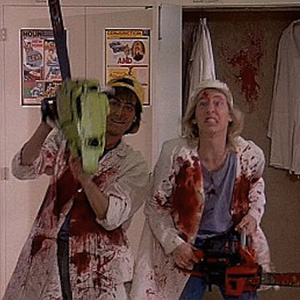

These are but the tip of the butcher knife, both in fiction and the reviews, blogs, memes, and critiques online.īut for every one hundred people who drop the term “Final Girl,” maybe one has ever read the origin text, Carol J. Halloween Kills has returned to the big screen one of the Final Girl foundations, hearkening back to John Carpenter’s 1978 classic, Halloween. Grady Hendrix’s latest novel, The Final Girl Support Group, trades explicitly on the term.

Stephen Graham Jones’s brilliant novel, My Heart is a Chainsaw, features Jade, a protagonist who’s obsessed with Final Girls in the films she watches and the local events where she lives. There is no condescension in this significant and probing discussion of psychology and sexuality and their role in lurid fantasy."-Desmond Ryan, Philadelphia Inquirer "Fascinating, Clover has shown how the allegedly naive makers of crude films have done something more schooled directors have difficulty doing - creating females with whom male veiwers are quite prepared to identify with on the most profound levels"-The Modern Review "It's easy to see why this book is considered such a landmark in film analysis.It seems everywhere you look in horror fiction and fandom these days, the Final Girl is the buzz. She suggests that the "low tradition' in horror movies possesses positive subversive potential, a space to explore gender ambiguity and transgress traditional boundaries of masculinity and femininity."-Andrea Walsh, The Boston Globe "Clover makes a convincing case for studying the pulp-pop excesses of 'exploitation' horror as a reflection of our psychic times."-Misha Berson, San Francisco Chronicle "Clover actually bothers (as few have done before) to go into the theaters, to sit with the horror fans, and to watch how they respond to what appears on screen."-Wendy Lesser, Washington Post "In her reading of both particular horror films and of film and gender theory, Clover does what every cultural critic hopes to: she calls into question our habits of seeing."-Ramona Naddaff, Artforum "Clover, takes the most extreme genre, horror flicks, seriously. argues that most horror films are obsessed with feminism, playing out plots which climax with an image of (masculinized) female power and offering visual pleasures which are organized not around a mastering gaze, but around a more radical "victim-identified' look."-Linda Ruth Williams, Sight and Sound "Carol Clover's compelling challenges simplistic assumptions about the relationship between gender and culture.

Bubbling away beneath Clover's multi-faceted readings of slasher, occult, and rape-revenge films is the question of what the viewer gets out of them.

" brilliant analysis of gender and its disturbances in modern horror films.


 0 kommentar(er)
0 kommentar(er)
